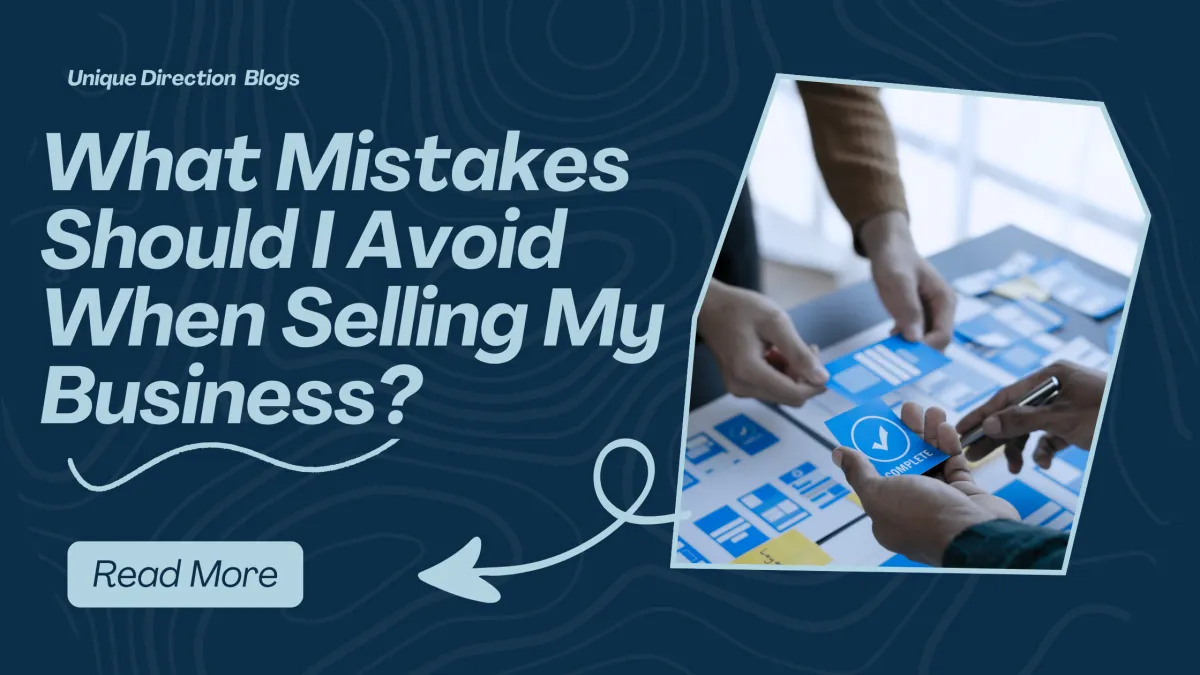
What Mistakes Should I Avoid When Selling My Business?
What Mistakes Should I Avoid When Selling My Business?
When it comes to selling a business, it’s not usually one big failure that derails the exit — it’s a series of small, avoidable mistakes that compound over time.
Most of them happen before the deal ever begins.
Here are the most common errors founders make during the sale process — and how to avoid them with preparation, clarity, and the right strategic guidance.
Mistake 1: Waiting Until You’re “Ready” to Start Preparing
Founders often wait until they’re emotionally ready to sell before they start preparing the business. By that point, it’s too late to fix the issues that really matter to buyers.
Avoid it:
Start preparing long before you think you need to. You don’t have to go to market yet — but you do need to ensure your systems, team, and value drivers are aligned and visible.
Mistake 2: Overvaluing the Business Based on Emotion, Not Evidence
You see years of hard work. Buyers see risk, process gaps, and customer churn. Without clear valuation drivers in place, emotional pricing will only lead to disappointment.
Avoid it:
Get an independent, buyer-based valuation perspective — not just a profit multiple. Understand why a buyer would pay more, and what would give them pause.
Mistake 3: Trying to Sell Without Reducing Founder Reliance
If you’re still the one making the key decisions, solving client issues, or closing sales — the business isn’t truly sellable. It’s reliant, not ready.
Avoid it:
Systemise roles. Create succession plans. Empower your second tier leadership. A buyer isn’t buying you — they’re buying what can run without you.
Mistake 4: Listing the Business Before It’s Prepared
Jumping straight to a broker or listing platform without proper preparation is a classic misstep. It hands control to buyers and often leads to lower offers or failed deals.
Avoid it:
Do the work first. Package your business for exit like you’d package a product for market — clearly, confidently, and with the buyer in mind.
Mistake 5: Poor Financial Reporting or Incomplete Documentation
Inconsistent numbers. Missing contracts. Unclear costs. These create friction and doubt. And doubt kills deals.
Avoid it:
Build a clean, complete data room before you go to market. Monthly management accounts. Contracts. Processes. Dashboards. Show the buyer your business is well-run — on paper and in practice.
Mistake 6: Focusing Only on Revenue, Not Profitability or Scalability
Many founders chase growth right before a sale — assuming more revenue means a higher valuation. But buyers care more about margin, simplicity, and scalability.
Avoid it:
Strip out low-margin offerings. Clarify your commercial model. Highlight where profitable growth comes from — and what it could look like under new ownership.
Mistake 7: Not Controlling the Exit Narrative
If you don’t shape the story, the buyer will. And if your business isn’t positioned clearly — with strategic value, team strength, and future upside — you lose leverage.
Avoid it:
Build your exit narrative early. Align it to the type of buyer you want. Support it with data and structure. Make it believable — and valuable.
How Unique Direction Helps
USP Highlight — Full Exit Strategy Support
At Unique Direction, we don’t just help you avoid the mistakes.
We help you design and execute a buyer-aligned strategy that puts you in control — from preparation to final negotiations.
Across our three-phase approach:
The BuyerLens Audit uncovers what’s helping or hurting your valuation
The Strategic Exit Multiplier aligns your structure and strategy to buyer expectations
The Deal Ready Accelerator gets your business packaged, documented, and de-risked — so you avoid the missteps that slow or kill deals
We’re not brokers. We’re your strategic partner before the sale ever starts — and we make sure you don’t miss what most founders do.
Final Thought
You’ve built the value. Now you need to protect it.
Avoiding common mistakes doesn’t mean doing everything perfectly — it means preparing smartly, leading the process, and making the buyer’s job easy.
If you’re serious about exiting without regret — let’s talk. A discovery call could save you months of wasted effort and thousands in lost value.
Next Read
1.When is the right time to sell my company?
2.Steps to sell a business successfully
3.How can I increase the value of my company before selling?
